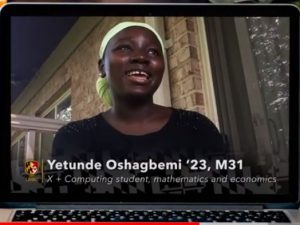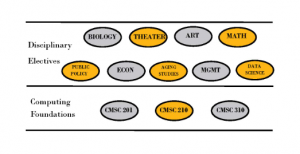The Computing Minor @ UMBC: an opportunity for students of all disciplines to build and sharpen their technology skills
A Minor in Computing will be offered beginning Fall 2021 by the Department of Computer Science and Electrical Engineering in collaboration with departments across all colleges of UMBC. This was developed with support from the National Science Foundation.
You can view a summary explanation of the program here (click the “pop out” button in the top right to view a full screen version of the video):
Computing is an increasingly integral component of our society. It is not just computer scientists that need to study computing. People across the arts, humanities, social sciences, sciences, and engineering, all need familiarity with computing, since computers and computational approaches are now an integral part of most disciplines. As computational approaches like AI and Data Science influence our society, questions are also being asked about social impacts, ethics, and policies around these approaches. Engaging in these conversations is helped by a background in computing.

“I think this is a very good experience for me… This is something I will definitely invest time in just because of how much I learned and how important I realized it will be to my success in the future.” Yetunde Oshagbemi, Class of 2023
The Computing Minor, offered by the CSEE Department in collaboration with many others, is meant for students in any discipline other than Computer Science, Computer Engineering, or Information Systems who are interested in programming, computational thinking, and applying computing to their major area. The minor consists of a series of foundational courses in computing followed by electives from multiple disciplines which allow students to use computing in other disciplinary settings.
Unlike the Computer Science minor, the Computing minor is designed for students who don’t have a STEM background. Students in majors that have math requirements similar to the Computer Science B.S. are encouraged to consider the Computer Science Minor instead of the Computing Minor.
“Coding has become as important as writing, as reading, as mathematics. We need all students learning how to code, and many more disciplines are relying on coding in their work, not just in the STEM areas, but across the different disciplines.” Freeman Hrabowski, President of UMBC
The minor in Computing consists of 19 credits – 3 core computing courses (10 credits) and 3 elective courses (at least 3 credits each) taken in other disciplines. A minimum of nine credits must be at the 300 or 400 level. A minimum of six credits in the minor must be done at UMBC. To complete the minor, students must complete six courses (19 credit hours) meeting the following requirements:
- Complete CMSC 201 (any section, including the special section for non-majors), CMSC 210, and CMSC 310 each with a C or better.
- Complete three of the following elective courses: AGNG 361, ART 486, ECON 320, 421, 422, 423, PUBL 600, 604, THTR 231, 235, 237, 335, 337, ECAC 317, CMSC 304, BIOL 313, 410, 415, 428, 495, IS 202, 295, 296, 430, 460, 461, 470, MGMT 210, 310, 410, DATA 602, 603, 604, MATH 447, 221, 341, STAT 355, 433 each with a C or better.
Courses required for the Computing Minor
There are three main courses in the Computing Minor: CMSC 201, CMSC 210, and CMSC 310. Student may complete either the CMSC major version of CMSC 201, or the non-majors version.
CMSC 201
CMSC 201 is a course that provides students with an introduction to programming using the Python programming language. Computing minors will use Python in CMSC 210 and CMSC 310 as well, so this course provides a firm foundation for further growth in the minor. The assignments in this course reinforce the lecture topics and gradually acclimate students to constructing large software projects.
CMSC 210
CMSC 210 has two main objectives: finish the introduction to Python programming started in CMSC 201, and then use the Python language to learn further technological skills that can be applied across various fields. These skills include:
- Database/Spreadsheet management
- Version Control
- Plotting and Data visualization
- Exploratory Data Analysis
- HTML and CSS
- Basic web development
- An introduction to machine learning
CMSC 310
The final course in the series aims to develop students’ abilities to think computationally and develop algorithms. Students in this course will learn more about how to measure the efficiency of software and leverage computational thinking to solve problems. Furthermore, students will learn how data can be stored to be saved and retrieved efficiently.
Further information on the Computing minor
If you have questions about the Computing Minor, please feel free to contact Dr. Ben Johnson <ben.johnson@umbc.edu>
